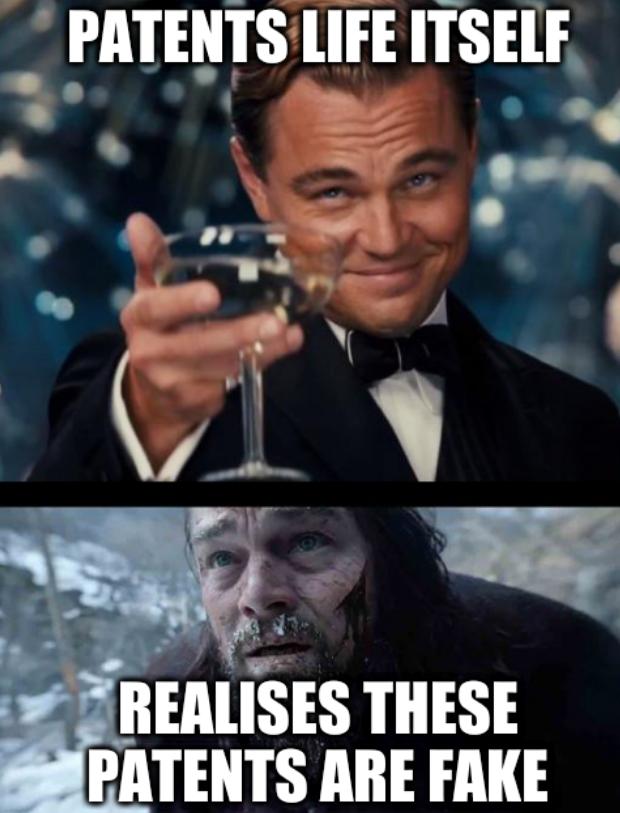

NOT much remains to be said about what happened yesterday, probably somewhere in Haar (yes, Haar).
"They facilitated the monopolisation of life and nature. That's how morally bankrupt those people are..."Well, posted in EUbusiness (as a press release) was the following important statement, which overcomes some spin and face-saving nonsense that was posted on a Friday morning amid pandemic [1, 2]. When few people notice...
The Board concluded that plants and animals obtained by 'essentially biological processes' are not patentable, with the exception of patent applications filed before July 2017. This verdict is in line with the interpretation of European patent law as decided by the 38 member states of the EPO in 2017. No Patents on Seeds! welcomes the verdict but is also demanding further political decisions to close still existing loopholes. Access to biological diversity needed for further breeding must not be controlled, hampered or blocked by any patents.
"For more than ten years we have been fighting against patents such as those on broccoli, tomatoes, peppers, melons and cereals. Therefore, we welcome this verdict in the name of the European public, gardeners, farmers and consumers. Knowledge of methods of breeding plants and animals continues to evolve as a common good from the activities of farmers and breeders over centuries, it is not invented by industry. In future, conventionally bred plants and animals have to be kept available for further breeding," Martha Mertens says for Friends of the Earth Germany.
"We hope the new verdict will help to put an end to a decade of complete legal absurdity and chaotic decision-making at the EPO. However, there is still a huge risk that big corporations, such as Bayer (previously Monsanto) will try to abuse patent law to take control of our daily food," says Katherine Dolan for ARCHE NOAH. "The problem is not yet solved. Further political decisions still have to be taken to close the existing loopholes."
Indeed, there are still reasons for concern. As a recent report from No Patents on Seeds! shows, clear definitions are needed to distinguish patentable technical inventions from the random processes used in conventional breeding in order for existing prohibitions to be effective. Unless there are adequate definitions, 'technical toppings' such as those describing random mutations, can still be used to claim plants and animals as 'inventions'. There are several examples showing how companies easily escape the current prohibitions, e.g. European patents on barley and beer, melons or lettuce.
The Enlarged Board of Appeal, the highest level of judicial authority at the European Patent Office (EPO), issued its opinion G 3/19 on questions related to the patentability of plants and animals.
The opinion, triggered by a referral from the President of the EPO in April 2019, concludes that plants and animals exclusively obtained by means of an essentially biological process are excluded from patentability under the European Patent Convention.
Speaking on the case, António Campinos said, ‘I strongly welcome the opinion of the Enlarged Board of Appeal. It will bring greater legal certainty for patent applicants, and the general public, on what is a sensitive and complex issue that has legal, societal and economic implications.'
The Office will act in accordance with the clarifications provided in the Enlarged Board's opinion and implement them in its examination practice in close consultation with stakeholders. Proceedings in examination and opposition which were stayed while the referral was pending will be gradually resumed.
Plants and animals exclusively obtained by essentially biological processes are not patentable, says the Enlarged Board of Appeal of the European Patent Office (EPO).
Whilst this decision might bring “greater legal certainty” with respect to the patentability of plants, it generates numerous other areas of legal uncertainty.
Firstly, how can the Boards of Appeal of the EPO demonstrate that they are an INDEPENDENT judicial instance, as required, for example, by TRIPS?
The members of the Boards of Appeal are subject to the disciplinary and reappointment authority of the AC. This calls into question whether it is possible for any decision of a Board of Appeal that finds an absence of conflict (in the sense of Article 164(2) EPC) to avoid perceptions of partiality in favour of the AC … who will, of course, have authored the allegedly “conflicting” Implementing Regulation.
Secondly, as the EBA correctly observes, the Court of Justice of the EU has not yet interpreted Article 4(1)(b) of the Biotech Directive. Thus, in view of the appeal decision in the Taste of Nature case, Article 267 TFEU means that any “final” judicial instance that is inclined to reach a contrary conclusion (that is, to reach the same conclusion as in G 3/19) MUST make a preliminary reference to the CJEU.
Thus, given that the Boards of Appeal have previously decided that they are unable to participate in the preliminary reference procedure, how can the Boards apply the ruling in G 3/19 without contravening EU law?
In other words, the ruling in G 3/19, whilst “resolving” a point of law that will be of relevance to a vanishingly small percentage of applicants, has simultaneously drawn attention to fundamental weakness of the EPC that now require urgent attention. Perhaps this can serve as a reminder of the danger of unintended consequences.
The referral was indeed considered admissible. The decision is likely to cause questions about the independence of the boards of appeal to become even louder. http://documents.epo.org/projects/babylon/eponet.nsf/0/44CCAF7944B9BF42C12585680031505A/$File/G_3-19_opinion_EBoA_20200514_en.pdf
Anon Y Mouse Thursday, 14 May 2020 at 19:44:00 BST
Note that the referral was only deemed to be admissible after the Enlarged Board itself rewrote the questions to make them admissible. This seems highly irregular.
Note also the following rather astonishing findings:
at II.5: "the scenario presented in the first question would, if followed to its logical conclusion, effectively give the Administrative Council, as the authority empowered by the EPC to adopt the Implementing Regulations, a “carte blanche” to deviate from established case law and give a particular meaning to any Article of the EPC by means of the Rules of the Implementing Regulations. This would open the door to the possibility of circumventing the statutory procedures for amending the Convention itself, namely by way of a diplomatic conference pursuant to Article 172 EPC or by unanimous vote in the Administrative Council pursuant to Articles 33(1)(b) and 35(3) EPC."
and at II.6:"Question 2 already contains, in thinly disguised form, the answer that it seeks".
Thus, it seems that despite these formal deficiencies in the President's original questions, which both (a) told the EBoA the answer that it "should" give; and (b) had potentially far-reaching implications allowing the AC and President to circumvent the EPC, the EBoA nevertheless did not throw out the case, but rather *rewrote the President's questions for him* in order to find them admissible and give him (most of) the answer that he wanted.
Merpel seems quite right in these circumstances to doubt whether the EBoA is truly able to stand up to an overweening President and craven Administrative Council...
[...]
broccoli Friday, 15 May 2020 at 12:21:00 BST
At the end of the day the Enlarged Board must take into account the changing intentions of the national states and EU and real policy considerations behind a prohibition. There is no reason to allow patenting of the products of essentially biological processes apart from legalistic analysis of the EPC. The EU and national governments have not taken this position, and so the Enlarged Board must be accepting of this reality.
[...]
DevilsAdvocate Friday, 15 May 2020 at 12:41:00 BST
The problem with this argument is there is an established way of changing the law and that is by changing the articles of the EPC. If it is truly the intent of the relevant states, then doing it that way shouldn't be so hard should it?
[...]
broccoli Friday, 15 May 2020 at 14:30:00 BST
Hi DevilsAdvocate
Case law evolves and that is what is happening, and diplomatic conferences to change the EPC happen only every 30 years or so. This way is easier, and realistically the only way to do as a practical reality. I don't see the national states objecting in any way, and let's be honest the situation of having the process prohibited and the product of the process allowable was very unsatisfactory
[...]
Proof of the pudding Friday, 15 May 2020 at 15:22:00 BST I agree with Devil's Advocate. The ultimate outcome is identical (in the sense of no retroactive effect) to what would have happened if the Biotech Directive or Article 53(b) EPC had instead been amended. So what, after all that, was the point of avoiding the straightforward option and instead pressing ahead with a course of action that now raises serious questions about the (lack of) independence of the EBA?
Sadly, that is not the only way in which this decision is likely to inflict long-term damage on the EPO. For example, there is also the fact that Article 164(2) EPC has been rendered otiose, as it is IMPOSSIBLE for any conflict to arise between an Article and an Implementing Regulation if the Boards adopt a "dynamic" interpretation of the Article that is based upon the "legislator's intent" as reflected in the Implementing Regulation. A sad day indeed for the rule of law.
[...]
Anonymous Friday, 15 May 2020 at 14:13:00 BST
Here is something I don't understand. The EBOA disapproved of the questions in the form that the President set out, because the logical conclusion was that it would allow the President to circumvent the EPC by amending the Rules to "give a particular meaning to any Article of the EPC".
But isn't that just what they've allowed him to do?
